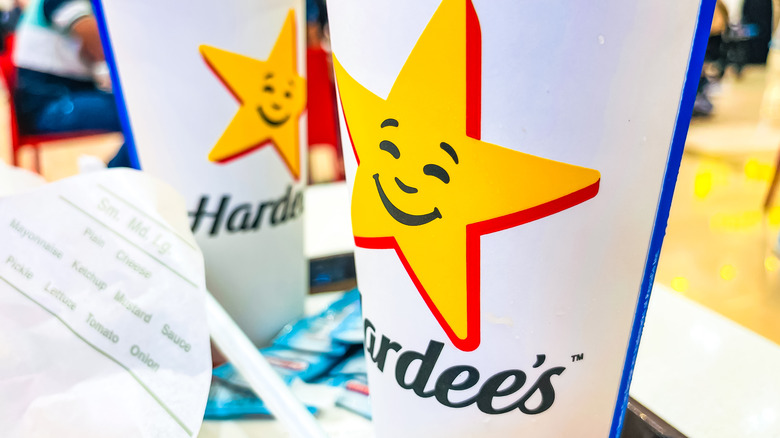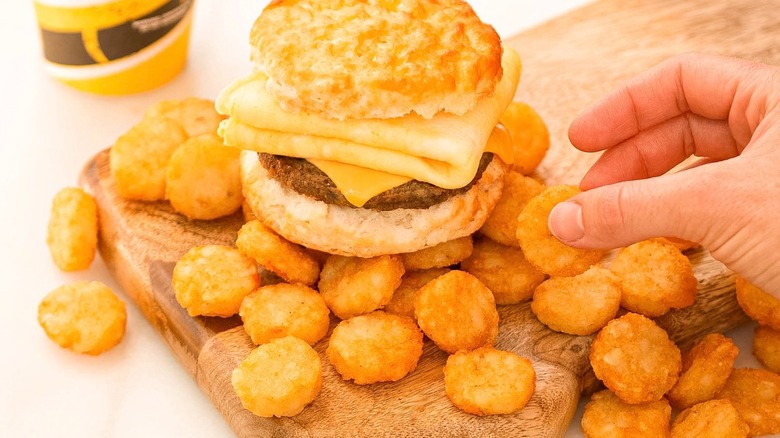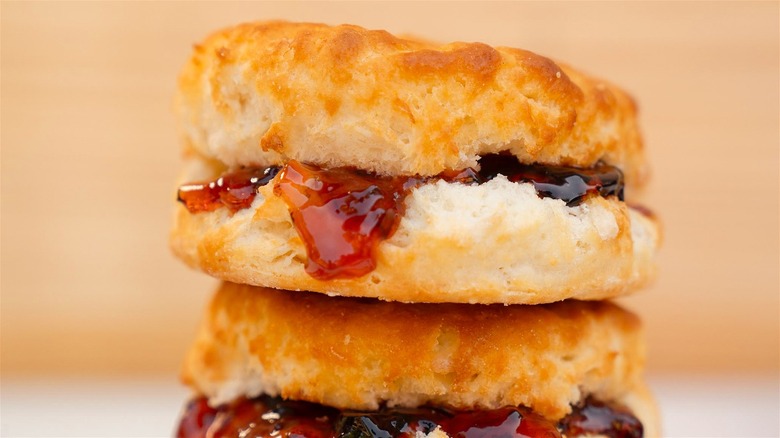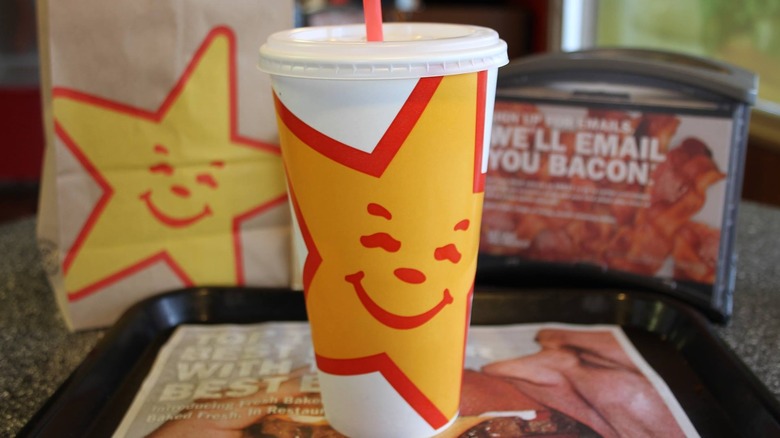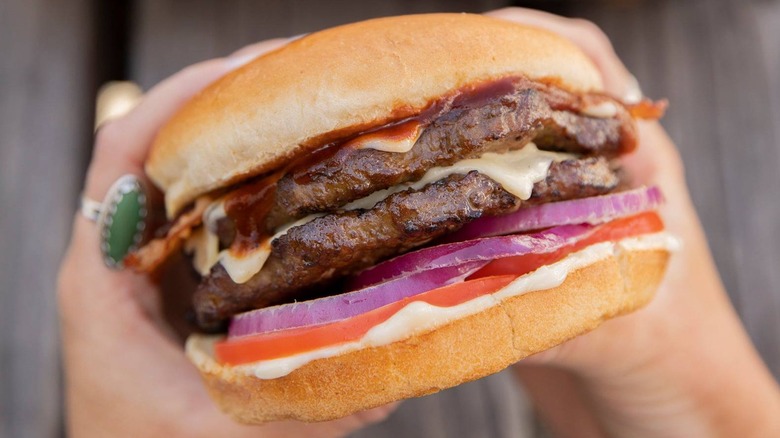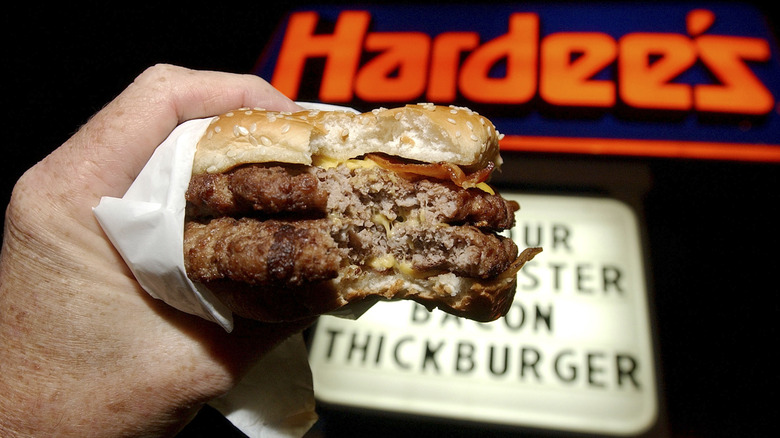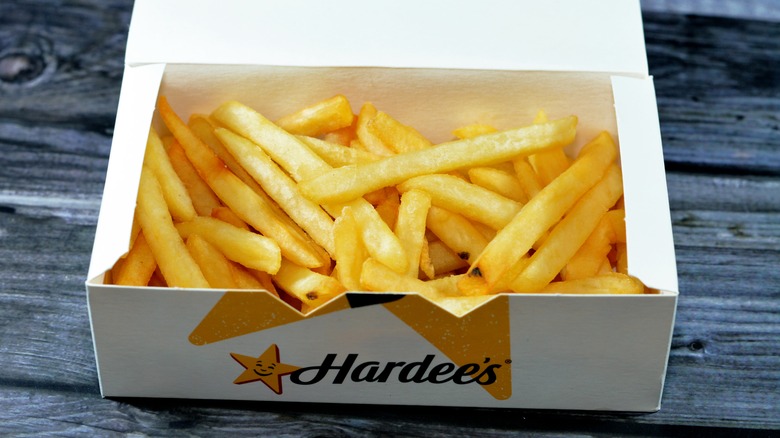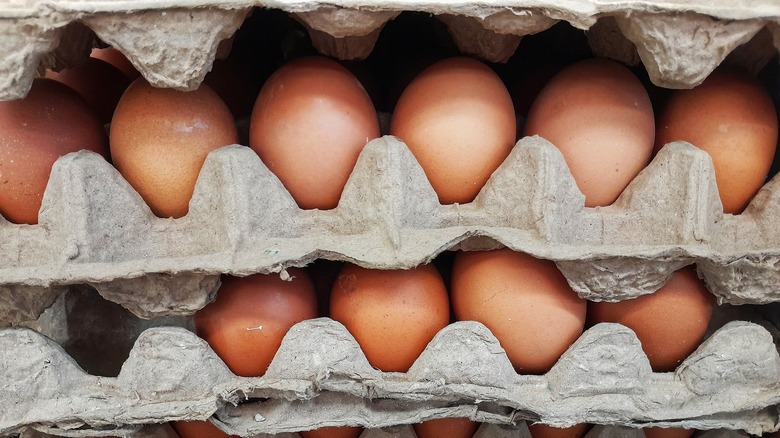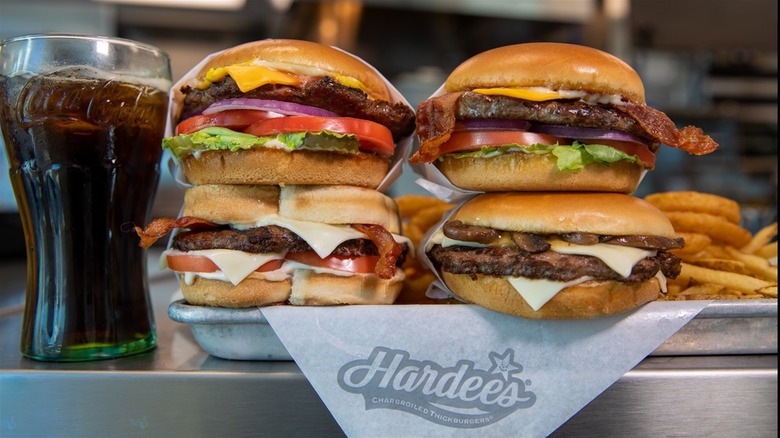Shady Things About Hardee's Menu
Hardee's may not quite sit on the same tier as the likes of McDonald's, Wendy's, or Burger King in the race for the nation's most famous burger joint, but it's put up an admirable fight. Founded by Wilber Hardee in North Carolina in 1960, the chain now boasts over 1,800 restaurants in the Southern and Midwestern U.S. as well as hundreds more dotting the Middle East in such nations as the United Arab Emirates, Lebanon, and Saudi Arabia.
Getting to this point hasn't been easy. Hardee's has faced its fair share of criticism over the years — primarily for its surprisingly suggestive advertising decisions. Back in the 2000s, the chain's commercial of choice was typically a scantily clad female celebrity (including Kim Kardashian, Kate Upton, and Paris Hilton) grasping or devouring a juicy burger. Hardee's started to shift away from this kind of advertising after its former CEO, Andy Puzder, resigned in 2017, but it takes more than a few years to totally forget or forgive an advert that, in the words of one social media user, "[set] feminism back by four decades" (via ABC).
Even in Hardee's post-sexy burger era, the restaurant (like all fast food chains) isn't totally without its shady secrets. For the customers picking up a Monster Combo or a Loaded Breakfast Burrito on a regular basis, there are a few things you may want to know before placing your next order. Here's what Hardee's doesn't want you to know about its menu.
Hardee's has been sued for discriminatory portions
One of the reasons why fast food restaurants are so, well, fast, is because everything is usually standardized to a tee. Employees carry out the same straightforward prep over and over again, which is why most menu items come out tasting and looking pretty much identical. That's what made it so obvious to one Hardee's customer that his order was a little out of the ordinary.
Tommy Martin was dining at a Hardee's restaurant in Belmont, North Carolina, when he was served just two Hash Rounds with his meal, a considerably smaller portion than the image shown on the Hardee's website, and denied more when he asked. Martin claimed that this happened because he is Black. "The manager came back and said that what you get," Martin told The Charlotte Observer. "Got home with tear in mine eye. I have got to do something."
In June 2019, Martin filed a discrimination lawsuit against Hardee's over the incident, alleging that while the Hardee's cashier tried to give him the usual number of Hash Rounds, the restaurant's manager interfered and denied him the complete order. However, just two months later, a federal judge dismissed the complaint, claiming that it was "frivolous and too vague and conclusory to pass initial review" (via Gaston Gazette). Of course, this story is just one from a single customer at a particular restaurant, but it's still alarming to hear that something like this could ever happen at Hardee's.
The biscuits aren't totally made from scratch
Hardee's is loud and proud about the fact that its iconic warm, fluffy, buttery biscuits are "made from scratch" on a daily basis. As it turns out, this may not totally be the case. We're not knocking the taste of Hardee's biscuits (in our opinion, they're the highlight of the menu and deserve to be served all day long), but several former Hardee's employees have delved into the biscuit prep process and explained that while they're definitely baked fresh in-store, half of the work is complete before they even get to the kitchen — and the only fresh ingredient involved is milk.
"They say it's from scratch but there's really not too much to it," claims one Reddit user. "The mix comes prepackaged. The only thing the biscuit maker actually does is mix that with buttermilk, roll it out, and cut it. It takes like 10-15 minutes to make a full batch." Another alleged Hardee's worker corroborates this claim, explaining that "restaurant biscuits that are made in store consists of dumping a bag of mix and a jug of milk into a mixer. It's extremely simple." In short, it's not worlds away from whipping up a box mix in your own kitchen. While we suppose that technically counts as handmade, we still think this is stretching the "made from scratch" claim pretty thin.
Hardee's lemonade also isn't hand-crafted
On that same note, the lemonade isn't quite as fresh as Hardee's would have you believe either. Available in two different flavors, original and strawberry, the Hardee's menu claims that these refreshing beverages are both "all-natural" and "hand-crafted." According to those in the know, this isn't strictly true, as the drinks arrive in its kitchens pre-made.
A Hardee's worker on TikTok demonstrated firsthand how the restaurant typically makes its lemonades. The video shows the original lemonade in a giant plastic bottle, mixed in with one or two pumps of strawberry flavor syrup — and that's it. Technically, yes, hands have crafted the lemonade as far as pouring liquids into a cup goes, and we're fairly confident hands were probably involved at some other point in the production process of the pre-made lemonade — but by that standard, every soda we've ever poured in our own kitchen is a hand-crafted beverage.
If you're really craving a handmade lemonade, you may be better off checking out our classic lemonade recipe, which only requires three ingredients and takes just five minutes to prepare — quicker (and involving much more human attention) than any Hardee's beverage.
Hardee's burger patties are cooked from frozen
Hardee's matches your sandwich cravings with two different kinds of meat: beef and chicken. Regardless of what you order, all of this meat is allegedly pre-frozen — a fact that's harder to ignore on some occasions than others. Hardee's customers have previously complained that the chain's burgers possess a strange, bubble-like texture, which fellow restaurant-goers have noted is down to cooking the frozen patties. "As these patties cook, steam is released and the congealed meat traps them in bubbles you see here," explains one Reddit user.
Chicken may not suffer the same bumpy side-effects, but it is also cooked from frozen. There's nothing especially insidious about cooking from frozen aside from the fact that it often doesn't taste as flavorful as fresh meat. Admittedly, we understand why fast food joints opt to do so, considering that it's so cost effective — especially in a post-pandemic world where supply chain and labor shortages have led to a 40% surge in restaurants using frozen meat. However, it's worth noting that plenty of fast food joints — including Wendy's, In-N-Out Burger, and Shake Shack — have a "never frozen" guarantee to ensure the freshness of each burger.
Customers think Hardee's secretly changed its beef
We used to live in a world where a ⅓-pound beef patty was the norm at Hardee's. The aptly-named Thick Burgers (and the Monster Thick Burger, which used a ⅔-pound beef patty) were a go-to for many Hardee's customers — emphasis on the past tense. Hardee's later switched up its menu, killing off Thick Burgers and downsizing its biggest beef patties to quarter pounders in the process.
At the same time, some customers are convinced that Hardee's silently decreased the quality of its meat. Not only are the patties thinner, but they think the flavor has also taken a dip in recent years. "They definitely did change their patties, those saying they didn't must not know what the patties were like 5+ years ago," complained one Hardee's customer on Reddit. Hardee's employees have corroborated this idea. "They used to have ¼, ⅓, and ½-lb burger patties that were pre-seasoned and thicker (they also looked almost like cooked meat as they were a deeper brown), which was what the original thickburger trademark came from," one explained on Reddit. "They went to thinner patties ... These burgers are unseasoned and 'raw' but Hardee's employees season the ⅓ lbs with salt and pepper before putting them in the charbroiler." Of course, there's no official word from Hardee's, but it does make sense, considering the sentiment around its beef right now.
Some customers think shrinkflation has hit Hardee's
In this day and age, it would be quicker to list the businesses not suspected of shrinkflation than those that customers believe are slyly reducing its portion sizes for the sake of profit. Unfortunately, Hardee's would not feature on this list, as several patrons have already voiced their concerns that the burger joint is quietly downsizing some menu items — without lowering prices (in other words, shrinkflation 101).
Affected menu items include the lemonade (which is now allegedly served up in a 32-ounce cup if you order a large, as opposed to the previous size of 44 ounces) chicken tenders, burgers, and more. "Hardee's quality has really fallen off, shrinkflation hitting hard," one customer complained on Reddit after sharing pictures of their notably small chicken tenders. "Used to get chicken tenders 5-6 inches long, the breast meat was juicy and thick, breading was crispy. These are less than half the size."
On the plus side, you can count on one menu item dodging shrinkflation — at least for now. According to Hardee's employees on Reddit, the restaurant still uses the exact same biscuit cutters it's always used, meaning that your biscuits should be a uniform size from store to store. Sure, the biscuits may not be totally made from scratch, but at the very least, they provide some kind of silver lining in a world of dwindling portions.
It's been accused of going back on its promise to use cruelty-free eggs
Fast food chains are under constant pressure from activists to source more ethical, humanely-procured animal products. Some have met these demands spectacularly well. According to The Humane Society of the United States, Chipotle is the fast food chain that's most impressively improved its sourcing practices, while Waffle House is the worst. Meanwhile, CKE Restaurants, which operates Hardee's and Carl's Jr., sits at a middling spot of 42 out of 62.
One of the biggest reasons for this less-than-stellar ranking is the fact that many feel Hardee's has backed out of its promise to phase out eggs sourced from caged hens — a practice that many feel is cruel due to the confined life it inflicts upon the chickens. Back in 2016, Hardee's promised to achieve this goal by 2025. As of 2024, there's no official update on its progress other than a vague claim on Hardee's website that the restaurant chain is "on track to transition our egg supply."
Animal charities have called out Hardee's for the lack of updates, with The Humane League pointing out that competitors such as Jack in the Box and White Castle have been much more transparent and that McDonald's and Taco Bell have already achieved their goals. "Customers have been misled and have a right to know what their hard-earned money is paying for," The Humane League states in its petition to encourage a little more transparency from CKE Restaurants.
Hardee's may have backtracked on its promise to source more humane meat
Eggs aren't the only cause for concern at Hardee's. In 2022, World Animal Protection claimed that CKE Restaurants had walked back on the pig welfare promises it had made in 2007, removing the original commitments to source pork from suppliers that don't use gestation crates (a practice that forces pregnant pigs to live in crates barely bigger than a sow for the sake of maximizing space) from its website. "We take the animal welfare concerns very seriously," said Hardee's spokesperson Jeff Mochal at the time (via PETA). "When you meet with PETA they make a pretty good case. We want to stay consistent with where the industry is at now and where it's heading."
Fast forward 17 years and the Hardee's website simply claims that it "began our commitment to group housing for pregnant sows in 2016" (a solid seven years after these initial promises were made) and that it is "exceeding an average of 65% of sows sourced from group housing," with no clear progression goals listed. As a result, Hardee's, along with such restaurant chains as Domino's, Panda Express, and Whataburger, was classed as one of World Animal Protection's "Tier 6" restaurants, a category reserved only for those making "very poor progress" on investing in humane food systems — a big "yikes" all around!
